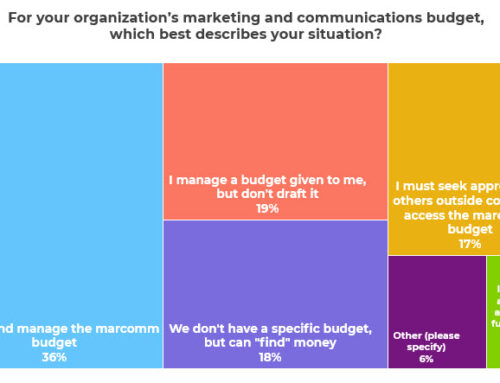
Guest Blogger |
Last week I wrote a post criticizing the Special Olympics’ decision to use a movie boycott to launch a campaign against the use of the word “retard.” The post was picked up by the Chronicle of Philanthropy, where it received quite a few comments on all sides of the debate (some obviously from Special Olympics insiders, though they did not identify themselves that way). I asked Rebecca Jamison, a big movie buff, a big sister to a Special Olympics athelete, and one of my best friends, for her take on the issue. Here’s what she has to say about the use of movie boycotts as nonprofit advocacy and about this specific boycott of Tropic Thunder by the Special Olympics.
~Kivi
When I first heard there was a boycott called by the Special Olympics against Tropic Thunder, my first thoughts went back to two previous film boycotts – the late 1980s boycott by religious conservatives of The Last Temptation of Christ and the 1990s boycott by gay activists of Basic Instinct.
Now I guess the boycotts achieved something in that I remember them, but not in glowing or effective terms. The Last Temptation boycott seemed very ill advised to me at the time and I was a junior in a Kansas Church of the Brethren founded college! This was a Martin Scorsese film adaptation of a novel by Nikos Kazantzakis, the same guy who wrote the beloved Zorba the Greek. I read the book and found it moving and helpful in interpreting the life of Jesus and appreciating all the more what he may have faced, experienced as a mortal man asked to fulfill an incredible destiny. The Devil, as described in the Matthew, Mark and Luke, did tempt Jesus. Why a dramatization of another temptation was wrong or should be banned, I never understood.
It reminds me of the sentiments that led to the fatwa against Salman Rushdie. For in his Booker Prize winning novel, Satanic Verses, Rushdie envisioned the Prophet Mohamed also dealing with the Devil’s temptations. Many Americans thought that the reaction of Iranian followers of Islam was absurd. Interestingly the fatwa and the Last Temptation boycott were both in 1988-89.
And Basic Instinct, what is there to say about that boycott? Do folks now even remember there was a controversy? Leftist liberals in San Francisco took exception to gay characters being represented as serial killers. They’d had enough of it, with earlier films such as Cruising with Al Pacino, The Eyes of Laura Mars with Faye Dunaway, and The Fan with Lauren Bacall to name a few. Gay=killer in too many films and the 1990s boycott was against this stereotype.
However, the Basic Instinct boycott didn’t work; it did not curtail the movie’s box office or derail the career of its two stars, Sharon Stone and Michael Douglas. Ironically, Sharon Stone is now a huge gay icon. If anything I think it increased interest in “alternative” lifestyles. I am probably one of five people who remember there was a boycott.
So Kivi asked me to contribute to this debate on Tropic Thunder because I have a brother who is mentally and physically challenged, and has several Special Olympic gold and silver medals adorning his bedroom wall. Terry has a rare disorder that is yet to be defined as familial or non-familial dysautonomia. The genetic test is at the lab as I type.
Has he ever been called the “R” word? Not in my presence. How would I feel were he were called that? Livid of course. But my thoughts would then steer to the uneducated, unenlightened status of the person wielding the insult, not to the disadvantaged person who received it, be it my brother or someone else. I don’t like the “R” word, but I personally do not think it historically or socially is equal to the “N” word.
And then there is Tropic Thunder. I watched this film in a New York City Upper East Side movie theatre, a bastion of intellectual liberalism if there is one, except perhaps LA from where most of the characters in the film hail. The NYC audience laughed at the “R” word’s usage between Robert Downey, Jr. and Ben Stiller as they discussed why Stiller didn’t win an Oscar, let alone got a nomination–Because he went “full r-tard” whereas other winners only had versions of the disability.
The audience around me laughed — I didn’t but I was watching, critiquing for this write up. Otherwise, I might’ve laughed. Why? Tropic Thunder is a satire, which all too often Americans just do not get. It seems too French or something. Satire is, and I borrow this definition from the Random House Unabridged Dictionary: the use of irony, sarcasm, ridicule, or the like, in exposing, denouncing, or deriding vice, folly, etc. [emphasis added].
The characters use of the word in Tropic Thunder demonstrated how utterly stupid, shallow and callous they were, not only in using it but in the approval of others from their community, e.g. Hollywood or the film/theatrical community in accepting its use. The use of the “R” word in Tropic Thunder was meant to point out that even in liberal Hollywood or New York, where people trip over their leftist sentiments, some words and ideas are still, wrongly, accepted, like the “R” word. The whole film is a critique of the ludicrousness of the Hollywood lifestyle and its’ values.
Now as to Kivi’s point that the boycott was perhaps ill advised. I now have to wonder, was it? I originally saw her point of view recalling the two other films mentioned earlier and was dismayed at the vitriol of the comments she received to her column questioning the efficacy of a boycott. But here we are talking about the use of the word. And that generally is the most a boycott can realistically expect to do-get us to talking.
Maybe, just maybe Ben Stiller who has been working on this project for 10 years wanted us to do that all along-see Hollywood for how insufferably frivolous it is. And to stop idolizing the idiotic people who work there. Or is that giving him too much credit? Let’s just be thankful its out in the open and we can now proclaim the use of the word Retard is obnoxious for everyone be it LA or New York or Kansas.
So denounce the word– not a satiric movie or Kivi for raising a question. Because if you have done the latter too, I’m afraid you’ve missed Ben Stiller and Kivi Miller’s points entirely.






